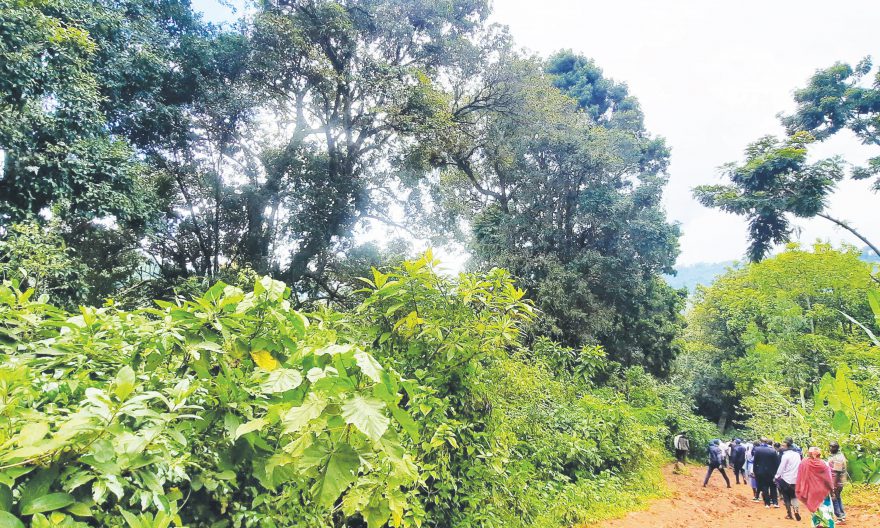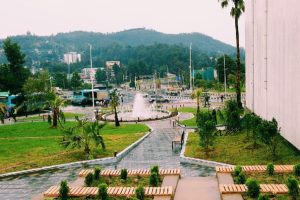
Gedeo is a zone in the South Southern Nations, Nationalities, and People’s State of Ethiopia, and it is an iconic place for its natural treasures, abundant megalithic archaeological sites and unique custom. Gedeo is famous for producing the global favorite Yirgacheffe coffee. This delicate, fruit flavored coffee does not come idle but from strong conviction and work on conservation. If you ever get lucky and happen to be in Gedeo, you would be surprised by the green nature of the environment. Enset (enset ventricosum), banana trees and coffee planations are found on the side of the road.
Across the world, there has been a challenge to preserve plant and animal species; and a wide range of campaign is still going on to fight deforestation and help protect the biodiversity. Ethiopia has been a victim of climate change that has resulted from deforestation and degredation. In response, the nation introduced ‘Green Legacy Initiative Campaign’ in 2019 and is going on successfully.
The Gedeo people, however, has an age long tradition of enshrining forests, plant and animals species through their well established customs and culture. Someone who cuts down trees or hunts down an animal or murders people will be a social outcast by the Gedeo people. He/she cannot even enter into sacred forests with out the approval and blessing of community elders.
Recently, a team of journalists and actors in tourism sector have been on tour to different tourist sites in Southern State. However, before visiting one of the sacred forests of Gedeo, the ‘Wogidan Amba Forest’, members of the tour should have got the blessings of the community elders because the ritual of praying and other ceremonial events must take place before entering to the sacred forest.
Yosef Maru, Tourism Expert and a PhD candidate at Dila University, said that the Gedeo culture that is characterized by respecting elders, indigenous knowledge and agro forestry system played a significant role in protecting the environments and critical ecosystems.
“This is how Gedeo’s welcome guests. This place is called Songo by Gedeos. Songo is a hut surrounded where by trees and large field. It is a meeting place, cultural, environmental, social, and political issues are dealt with; local dispute, and conflicts are resolved by elders, and knowledge is passed onto the next generation. It is in this places decrees such as people to protect the enviroment are made. There are 525 Songo in Gedeo. Therefore, this place plays important role in Gedeo’s traditional agro forestry system.”
Community elder Geremew Debniyoa also said that the tradition has helped to preserve the ever greenness of the area and ensure people’s food security despite high population density. “Gedeo is unique from other peoples. The Gedeos never kill even animals. There is no murder. It is a curse. They do not also cut trees. What you see here is a forest that lived for many centuries. This is a testimony that Gedeoes do cut trees. It is a virgin land. Not even pick or plow touches this land.”
Geremew said thanks to the tradition, sacred forests like Wogidan Amba are intact and hosted various plant species and animals like lion, fox and hynea. As to the elder, the livelihood of the community relies on this heritage; and it is upto the posterity to preserve this heritage, keep the forests and the environement healthy.
Upon registering Gedeo Cultural Landscape on its tentative list, The United Nations Educational, Scientific and Cultural Organization (UNESCO) wrote: “Strengthening the traditional institutions such as Songo and Baalle in Gedeo supports the management of the existing biodiversity.” Dilla University is therefore working to preserve and support this traditional agro forestry system and its biodiversity.
In 2017, the Dilla University Botanical and Ecotourism Garden was established for the purpose of conservation, research, and education and recreation value. Director of the Center Talemos Seta (PhD) said the institution carries out research works that help preserve and multiple of indiginous plants. It also helps the unique Gedeo traditional agro forestry with its researches and promote this environmental conservation practice nationwide and even across the world in general.
“Gedeo people is prominent society in protecting environment. I think you have witnessed beautiful secenry of agro forestry. So, this botenical garden is established with aim of preserving this good practice and culture of the people. So we are closely working with community. We are attempting to preserve the culture and promote to the world in accordance with science.”
The Center is also attempting to contribute share for the success of national greenery intiative by providing guidance and distributing fitting seedlings to people. “This place has been working on environment long before the environmental campaign. The start of national greenery, however, made us on the spotlight. We are multiplying indigenous tree seedlings every year and distribute among the public as community service is one of our mission. So supporting the greenery initiave is our major task.”
As appreciated by environmental scientists, socio ecological studies and the UNESCO, indiginous knowledge has helped Gedeoes to have remarkable green sites and cope up with the large population density. The Gedeoes have developed an agro-forestry system which is regarded as a sustainable land use system in the country hosting a large number of population density of over 1,300 people per km² and harboring a rich bio-diversity. The Gedeo agro-forestry system has evolved for a long time without significant degradation and loss of biodiversity because it is based on indigenous knowledge of environmental management and land use system. The components of the agroforestry are mainly coffee, enset, indigenous trees, root crops, shrubs, etc. in which, every plant occupy distinct layers of the vertical space of the plant.
UNESCO underlined the Gedeo indigenous knowledge contribute for our understanding of cultural response and adaptability to climate change. The hopes are now high this heritage to join Ethiopia’s intangible heitage list under UNESCO. Meskel, Gada System and Fiche Chambalala are the three intangible heritages of Ethiopia inscribed by UNESCO. On top of the registration, the combination of tradition and science is encouraging both to preserve the tradition and make the Gedeo more productive. The research and Gedeo’s traditional practice are also essential for the country striving to have favorable weather condition and be food sufficient. The Dilla University Botanical and Ecotourism Garden, therefore, anticipates to promote and support this treasure and make the place center of eco-tourism that tradition and science thrive.
BY KFLEEYESUS ABEBE
THE ETHIOPIAN HERALD FRIDAY 21 OCTOBER R 2022





